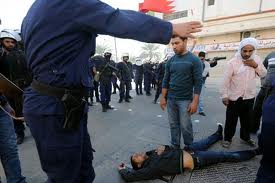‘Dialogue only way out of Bahrain crisis’


A political analyst tells Press TV that the only way out of the crisis in Bahrain is to give a way to the demands of the people for at least a constitutional monarchy and a fair participation of power by the people with the government.
Bahrainis have been staging demonstrations since mid-February 2011, demanding political reform and a constitutional monarchy, a demand that later changed to an outright call for the ouster of the ruling Al Khalifa family following its crackdown on popular protests. Bahrainis say they will continue holding demonstrations until their demands for the establishment of a democratically-elected government and an end to rights violations are met.
Press TV has conducted an interview with Intifad Qanbar, political analyst, to further discuss the issue. What follows is an approximate transcription of the interview.
Press TV: Since this second two year anniversary, a milestone that we have reached, it seems that on this side of the Bahraini revolution things have gotten significantly worse as far as the security crackdown goes. Do you believe that this year will be an [eventful] year in a sense for this revolution?
Qanbar: Well I think the exit to this mayhem, to this problem, to this oppression by an oppressive government [against] its own people, the only way is to give a way to the demands of the people for at least a constitutional monarchy and a fair participation of power by the people with the government.
I think that the government is in complete denial. They think by not addressing the real issues of the rights of the people, these things are going to go away.
This is not going to happen and this is also I must tell the allies of Bahrain which is primarily the United States of America, this revolution is not going to go away. Absence of fundamental solution to the problem and absence of giving the rights of the people, the people of Bahrain are not going to settle down.
There is now blood on the hands of the government and blood is not going to go away very quickly this time and in light the Arab Springs, this is going to continue and I think it is better to resolve this issue by a meaningful dialogue and meaningful talks with the people and sharing power unless I am afraid this issue may continue and may get worse and worse and we see more violence happening which nobody wants to see in Bahrain.
Press TV: Mr. Qanbar, what are your comments on two things? You know, one the Bahraini government has been trying to portray this as a sectarian issue, as a purely sectarian issue and second it is also been trying to say that all of these people who are out protesting on the streets have been influenced by foreign countries, by countries outside of Bahrain. How do you comment on those allegations?
Qanbar: Well the only foreign intervention we know of is the Saudi military intervention under the so-called the Gulf Shield. So I think all international reports and I have known many foreign journalists who were in Bahrain, who are not necessarily on the side of the people, who have witnessed and told me first hands testimony that there is no foreign intervention with the people.
The people are rising up against the government in peaceful demonstrations and I think the government claim of foreign intervention has been also denied by the Bassiouni report and also the Bassiouni report was very clear in shedding the light on the massive abuses by the government on the people.
So I think the government should blame itself by bringing foreign troops onto their own land, violating the security and the sovereignty of Bahrain itself and making Bahrain almost like a small town that is belonging to Saudi Arabia which is not fair to the people of Bahrain and not fair to the country of Bahrain which we all respect.
I think the claim of foreign intervention is waning down and it is not bringing any results and I think this is basically making the government looks like in complete denial of the real problem.







